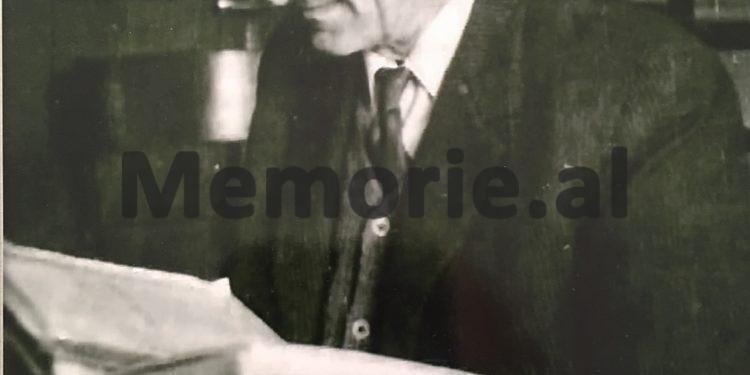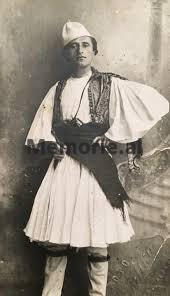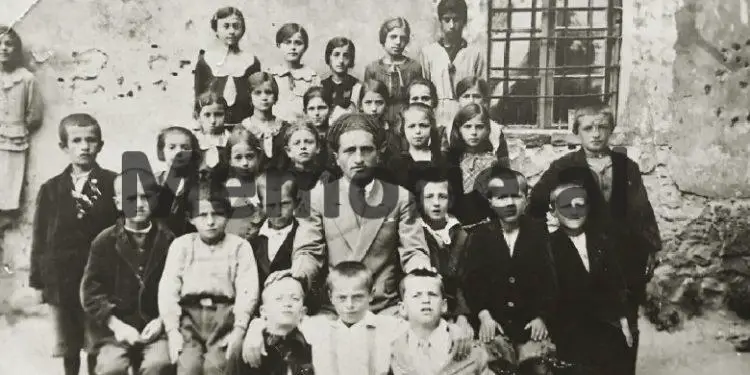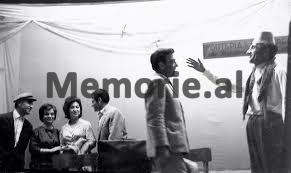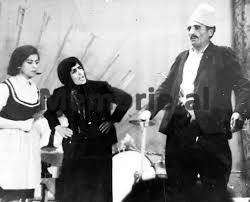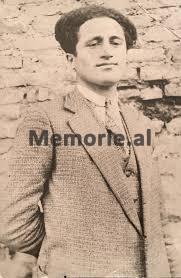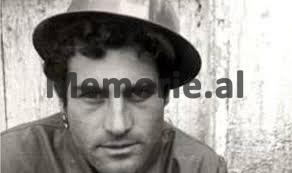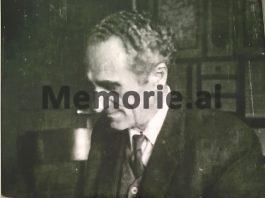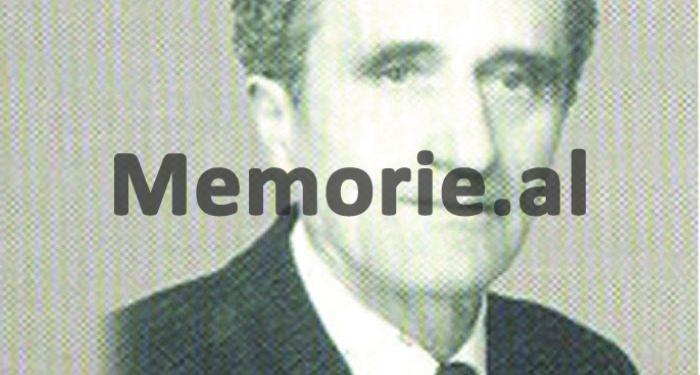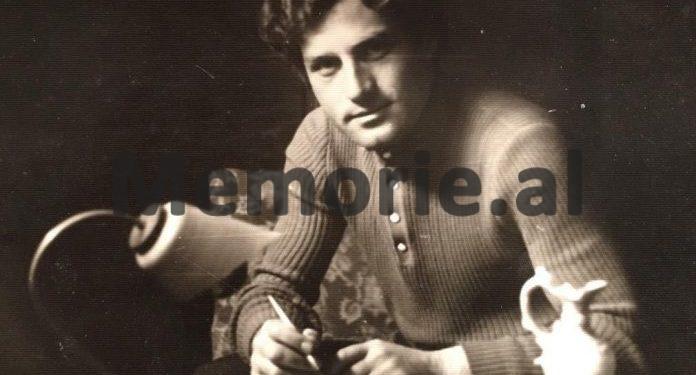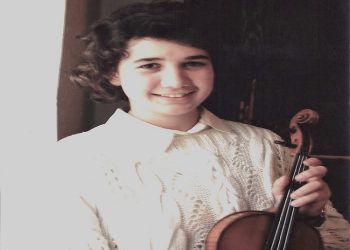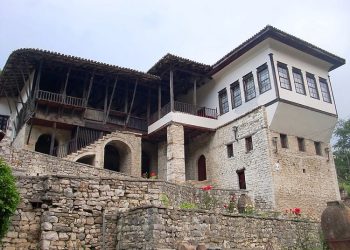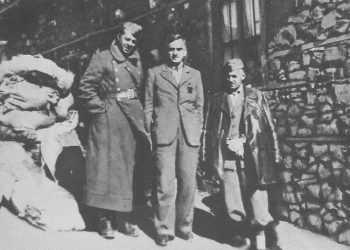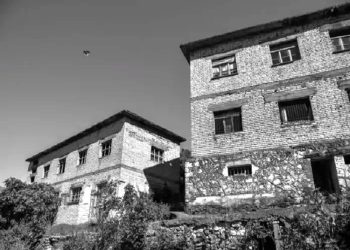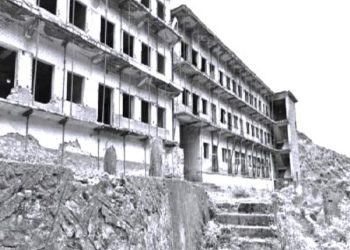Dashnor Kaloçi
Memorie.al publishes the unknown story of Hekuran Zhiti, the famous poet, actor and playwright originally from the village of Mëlova e Skraparit, who wrote the first poems and some theatrical pieces since he was a student at the “Normale” school in Elbasan, under the care of and the encouragement of two well-known professors of that school, professors Karlo Ljarja and Simon Shuteriqi, who were staged and performed by him in the city of Elbasan, etc., and the press of the Zog Monarchy, which considered him a quite talented poet and actor.
Hekuran’s balanced stance during the war period where he had close friendships with both the nationalist and communist forces of the National Front and his poem “The Embrace of Two Opponents” where he called for reconciliation and an end to the war. fratricide, which cost them dearly, because in addition to arresting and killing in torture in the city of Berat one of the brothers who was a teacher, arrested and tortured Hekuran himself, and the third brother, Ahmeti who had been a partisan and the name of He also appeared in the Museum of Çorovoda as a partisan of the first hours, he passed away a few years ago in the city of Durrës, as an honored veteran of the War.
Prolonged persecution by the communist regime by not giving him the opportunity to publish even though he was called to establish the Professional Variety of the city of Lushnja, where he was not allowed to work long, sending him to work as a porter in the Port of Durres and the Municipal Enterprise of that city, as a worker in paving and maintenance of roads, where he died in 1989, blinded, after having previously arrested and sentenced to ten years in prison, his son, Visar
The large three-storey house of the Zhites in Tomorr in the depths of the Skrapar mountains, where once gathered to gather the most famous men of that province, has not existed for years, as it has been deprived of its foundation stones and now it has only gloried the former fame. Even the above school that Maksut Zhiti (big brother) had opened no longer exists. About 120 hectares of land in the Greek village of Milovo in Thessaloniki, were owned by this family, which until the period of the Monarchy of King Zog, regularly rented. Among the many prominent men who stayed in Hasan Zhit’s large guest house since Independence Day was the patriotic elder Sali Butka, the house where he wrote most of his poems. Elder Hasan, a patriot and Bektashi, although not very educated himself, made sure that his children did not miss school. Thus, his three sons graduated from the “Normal” of Elbasan and the Lyceum of Korça, which were known and were among the most coveted schools of that time.
Hekurani, “Normalist” in Elbasan
Hekurani, was the second child of the three sons of the Zhiti family, was born in that village in 1913 and after receiving his first lessons in the city of Berat, he was sent on a state scholarship to the school of Elbasan otherwise known as “Normalja”, which he started in 1927. Among many of his peers who attended that school, Hekurani would form a close friendship with his classmate, Sterjo Spassen and also their teacher, Simon Shuteriqi, (father of Prof. Dhimitër Shuteriq), friendships that they would maintain until the last years of their lives. From his beginnings in this school, Hekurani showed a tendency to write poems, which he told to his teacher, Carlo Ljarja (father of the famous actor Rikard Ljarja from Shkodra), who helped and encouraged him by looking at him a promising talent. The passion for writing was acquired by Hekuran from his father Hasan, who as a Bektashi adored and knew quite well many of the poems of Naim Frashëri (in Persian), who had them all at home and kept them as the most expensive. In addition to Hekuran’s penchant for poetry, he displayed a talent as a performer for the theater. At school with his work and insistence, as well as with the help of pedagogue Carlo Ljarja, he formed a theatrical group, which began to show short pieces within the walls of the “Normal”, and then to the improvised scenes of the city of Elbasan, where hundreds of people gathered. One of his peers, Haki Ballshi, (former normalist) writes in his memoirs, among other things: “The laughter that Hekuran aroused had with him the optimism of life, dropping the vain questions. He was our Omar Khajami. But Zhiti with his humor, knew how to bring and winter in the faces of those who learned from evil.He had a strange ability of improvisation, and rode the time scenes playing the lead roles.It is enough to write on the posters that he interpreted Zhiti, The cinema hall was full of people. His portrait was sold in commercials on the streets of cities, thus becoming perhaps one of the most famous actors in the whole of Southern Albania, and foreign parts such as “Unwanted Marriage”, he adopted and adapted to the public of the time.I cannot forget the sensational success in Kavaja, so much so that our professor Vasil Andoni, who did the work of the prompter, could not bear it and out of joy entered the stage.And Hekurani in order not to spoil the part put in role. In the magazine “Normalisti” of that time (2 and 3 of 1933), among other things it was written: “The gas and the clapping of hands were heard everywhere, why Zhiti knows the ease of life … everyone was very satisfied and they besought Zhit not to forget the next year.
Meeting with Fishta
With the income they could earn from the modest theatrical performances, which they put on the stages of Elbasan and some other cities, the students of “Normale” made a tour through Albania. In this long excursion, which was made for the purpose of recognizing the birthplace, Hekuran’s class went to Shkodra, where he was received in a meeting by the famous poet Padër Gjergj Fishta. Regarding this, his classmate Haki Ballshi, again remembers: “Fascinated in front of him, Hekuran dared and made a joke and Fishta congratulated him”. Likewise, Hekurani himself, regarding the meeting he had with the great poet, would dwell for a long time in his memoirs, where among other things he writes: “Father Gjergj Fishta extended our package one by one. None of the boys dared to take cigarettes before I took it to please him and said, ‘I take it, because the hand that wrote that wonderful poem gives it to me.’ From that meeting, Hekuran would take from Fishta as an autographed memory the masterpiece of his, “Lahuta e Malcisë”, which the Zhiti family still preserves today as one of the rare relics, considering it as the greatest wealth they have as a family, as there is also the autograph of Hekuran’s older brother , who was tortured to death by the Communists, given Zhit’s great talent and the admiration of “Normale” students and teachers for him, at the end of the 1932 school year, they sent a letter to King Zog to take him to studies at a theater school in Italy, which was not possible. after the murder of Riza Cerova (friend of the Zhiti family), Hekurani wrote an elegy, which he interpreted himself. From this he was arrested by the King’s loyalists as an anti-monarchist but was not held long and released again. After finishing the “Normal” of Elbasan, Hekurani received his degree and was appointed a teacher in Roskovec of Fier and in the minority villages (Pogon), where he taught for three years. Hekurani was also one of the intellectuals of that time who opposed the fascist occupation of Albania. He wrote a poem about April 7, which for decades has been in the singing books of the lower but anonymous classes, without his name.
Writes the famous poem
In the years of the occupation of Albania, Hekurani was a teacher in Berat, where he led an active intellectual life. He had a close friendship with professors Abaz Ermenji and Sejfi Protopapa, (physicist in the USA, passed away a few years ago). In that city, Hekuran directed his artistic life and wrote a lot in prose, poetry and sketches and plays that he staged himself. As a rare man at the time, Hekuran had close friendships with both the leaders of the National Front and the communists. He called the war between them a national disaster and tragedy. He went and attended the funerals of those killed by the two opposing camps, the nationalists and the communists, where he read the elegies he wrote specifically for them. In one case, Hekurani intervened with the leaders of the National Front in the city of Berat, to release a communist, after he had previously received a letter from Mit’hat Frashëri. Gendarmerie Pjetër Gurakuqi, who handed over the captured communist, when he saw Mit’hat’s letter, addressed him: “Listen to Hekuran, if the partisans capture Mit’hat, they will cut off his tongue.” In one of his poems written at the time, in which he describes the fratricidal war, he expresses.
“… The stone and tiles are fried, the ground is irrigated /
Tomorri sits down on the fatos that have been spread /
this blood that I have in my breast, you will take to the Ocean /
For the whole world to see how much blood the rivers lead to … “.
At that time one of his brothers (Ahmeti) had become a partisan, while Hekuran left the communists. Among other things, the reason for this became a poem that he wrote and that is considered one of the most famous of that time. This poem, would become and the subsequent cause of his arrest by the communists, was entitled “The embrace of two opponents.” Its subject were two brothers, one with the National Ball and the other a communist, who were killed among themselves and thus embraced without giving up. This poem is considered rare at that time, because wherever it was written one side attacked the other, and he calls for reconciliation. This poem at that time had a great echo in the nationalist circles and was published and republished in many newspapers, such as “Oshtëtima e Korçës” (no. 1 February 1944), “Luftëtari i Lirisë” etc. At that time in Berat, Hekurani wrote dozens of theatrical plays, many of which he staged, performing himself. With great success were: “Shots for Freedom”, “Bankrupts”, “Wounds of Albania”, “Drama for the Congress of Lushnja”, “Joker and thugs”, etc. From the peaks of his creativity is considered the drama “The Mute Bride”, where he played the lead role himself.
Arrest, his brother is killed by the communists
Due to the fact that Hekuran Zhiti during the war period was engaged with the nationalist organization ‘Balli Kombëtar’ by cooperating closely and peacefully with the head of that nationalist organization, Mit’hat Frashëri, shortly before the end of the war, Hekuran was called to leave from Albania, along with many other nationalists. He did not leave, believing that he would not be harassed, because his brother (Ahmeti) came down from the mountains with the victors of that war. He stayed in Berat, where he continued to write and his parts were broadcast by Radio Berat, as it was then called a partisan voice center. Hekurani had a very close friendship with Vexhi Buhara and Mustafa Greblleshi, with whom he spent most of his time. After the first post-election elections, Hekuran was arrested by his older brother (Maksut) who was a teacher, accusing him of being “mixed with the ‘Group of Deputies'”. He dies in torture, being thrown from the steps of the investigation in the city of Berat, and to this day his remains have not been found! After that, Hekuran is fired and assigned to a tobacco warehouse. In 1946 he was arrested and tortured inhumanely. He is accused of the well-known poem, which, according to them, had done a lot of damage to you during the War and that Abaz Ermenji and Mit’hat Frashëri had left it there on a mission. After a year and a half in the investigator, he was released, declaring him undesirable in Berat. He, together with his wife and two small children, leaves and goes to Durrës, where he finds refuge in a dilapidated warehouse and starts working as a porter in the port. But after that he was taught and removed from the port, and he barely arranges for him to work in the communal, paving the roads.
In the Lushnja Variety Show
At that time, two of Hekuran’s friends, the well-known writers Nonda Bulka and Petro Marko, with the support of Karehman Ylli, intervened for Hekuran to work for “Hosteni” magazine. This was not accepted, but he was allowed to work as a teacher in Karbunarë of Lushnja. In that village, he began to prepare artistic groups, which led to him being called to Lushnje, where the professional Estrada of this city would be opened. Hekurani became one of the founders of this Estrade, together with Fotaq Filipeu (the pianist who accompanied Tefta Tashko Koço on her tours in Albania during the period of the Zog Monarchy), who had just been released from political prison. In that Estrada, together with Zhit, she would mark the beginning of her artistic career, the great Vaçe Zela, of Xhosho Vasija (the famous actor from Shkodra), who was interned in the villages of Lushnja. Hekurani worked as a professional actor for that Estrade from its inception in 1961, until he was forced to retire in 1972, when the crackdown on “foreign performances and liberalism” began. During those years, he remained prickly, as his biography was mentioned (after numerous anonymous letters) and he remembered poems that had no partisanship. He performed there with dozens of roles in various sketches, many of which he wrote himself. During a tour in Korça, he caught the attention of director Pirro Mani, who asked to take him to Tirana, but was not told to do so, as the famous director was reminded of the biography of the man he was looking for. In the year he was retired, he wrote the drama “Congress over mud”, dedicated to the Congress of Lushnja, but which he failed to stage. Well-known writer Mojsi Zaloshnja also tried to publish his book “Mathematical Magazines”, but was not allowed to do so, as permission was required from above, although some of his poems had been included in folklore books anonymously.
His son, Visar, in political prison, Hekuran dies blind
At the time Hekuran was expelled from Estrada, his two children were not allowed to go to university to pursue higher education. Then only one of his children, Visari, was able to complete his higher studies in Language and Literature in Shkodra. The two boys fired him and the third, Visar, who was a teacher in a remote village in Kukës, was arrested and sentenced to ten years in political prison for writing decadent poetry. (Which came after a note made by Ramiz Alia on the report-information of the apparatus of the Central Committee of the ALP where the “specialists” had “decomposed” and analyzed the poems of Visar). This event marked a fatal blow to Hekuran, as he was severely beaten, probably where he did not expect it, and after that he committed suicide at home. Blinded and helpless, he died in 1989 from repeated beatings, the worst of which was that of his son, Visar. Considered an enemy, official representatives and people of art were absent from his funeral, while his close friends could not miss Fotaq Filipeu, the only one who had the courage to accompany Hekuran to his last home. The farewell speech there was delivered by a simple man, who was a farm worker. One of his old friends (Haki Ballshi) hit like him, recalled one of Hekuran’s poems where it was said. “… How could I all watch / Without everything I would endure / Ah so, so what was said, / to see neither the sun nor the moon …”. Only after the ’90s, Hekuran Zhiti was announced’ Honorary Citizen of Lushnja and his name is also one of the streets of that city where he spent most of his life with worries and despair. Visar Zhiti, one of the most famous names in Albanian literature after the ’90s./Memorie.al




